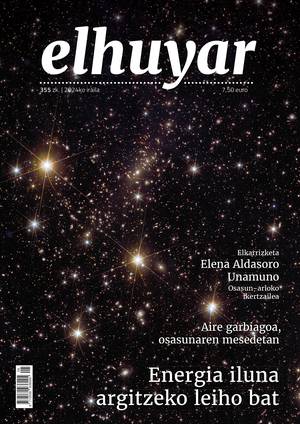A. F. Möbius and H. S. Jones
Elhuyar Fundazioa

Recent searches
German mathematician and astronomer was born two hundred years ago in Schulpforta on 17 November 1790.
Möbius studied at the universities of Leipzig, Götting and Halle. At first he wanted to study law, but with the influence of Gauss he began to work in mathematics and astronomy.
Currently Möbius is mainly known as a mathematician. The famous one is above all his special tape, the Möbius tape. If by turning on one end a piece of paper tape or other flexible material, the two ends are glued, you get a paradoxical image of a single edge and a single face (see "Möbius tape" Elhuyar. Science and Technology 1989. Number 29, pp. 16-17. ). Thanks to this he was one of the founders of the Möbius topology. Topology is the branch of mathematics on the invariable properties of images that deform without breaking.
In 1815 he was appointed professor of astronomy at the University of Möbius Leipzig. He was later director of the university's astronomical observatory and under his responsibility the new observatory was built from 1818 to 1821.
Möbius published numerous works in the field of astronomy, including three: By Computandis Occultationibus Fixarum per Planeta (1815), Die Hauptsätze der Astronomie (1836) and Die Elemente der Mechanik des Himmels (1843).
Most of Möbius’s mathematical works were published in the journal “Crelle’s Journal” between 1828 and 1858. His work focused mainly on geometry, developing and applying the methods collected in the book Der barycentrische Cal? Calculation of centers of gravity (1827). He introduced homogeneous coordinates in analytical geometry and also devoted himself to geometric transformations, especially projectives.
In 1837 he published the book Lehrbuch der Statik (Static Guide), dedicated to this branch of mechanics.
Astronomer and mathematician Möbius died in Leipzig on 26 September 1868.

Recent searches
The astronomer was born in London on 29 March 1890. He studied at Cambridge, obtaining a bachelor's degree in 1911 and a master's degree in 1914. From 1913 to 1923 he worked as an assistant at the Astronomical Observatory in Greenwich and after ten more years at the Observatory of the South African Republic.
Jones' dream was to accurately calculate the distance from Earth to the Sun. For this he took special care when the Moon hid the stars in order to obtain the distance to the Sun. However, his most important work was done in 1931 through the asteroid Eros.
As Johann Galle suggested almost a century earlier, the parallax of asteroids would allow calculating the scale of the Solar System. However, the asteroids that were then known were too far away to provide precise spots, but in 1898 they discovered the asteroid Eros and its orbit passed through the Earth closer to the Moon than any other star. In 1931 they measured his closest distance. 25.5 million kilometers from Earth, two thirds of the shortest distance to Venus and half of the shortest distance to Mars.
Subsequently, fourteen observatories from around the world participated in another larger procedure, which for six months carried out almost three thousand photographs of Erosi. Later, under the direction of Jones, ten years of calculations were made. In 1942 Jones published the result, stating that the distance to the Sun was 149.5 million kilometers.
In 1943 Jones was awarded for his work and until almost twenty years later his calculations were the most accurate, since then, with the radar waves, they gave more precision the scale of the Solar System.
Astronomer Harold Spencer Jones died thirty years ago in London on 3 November 1960.






